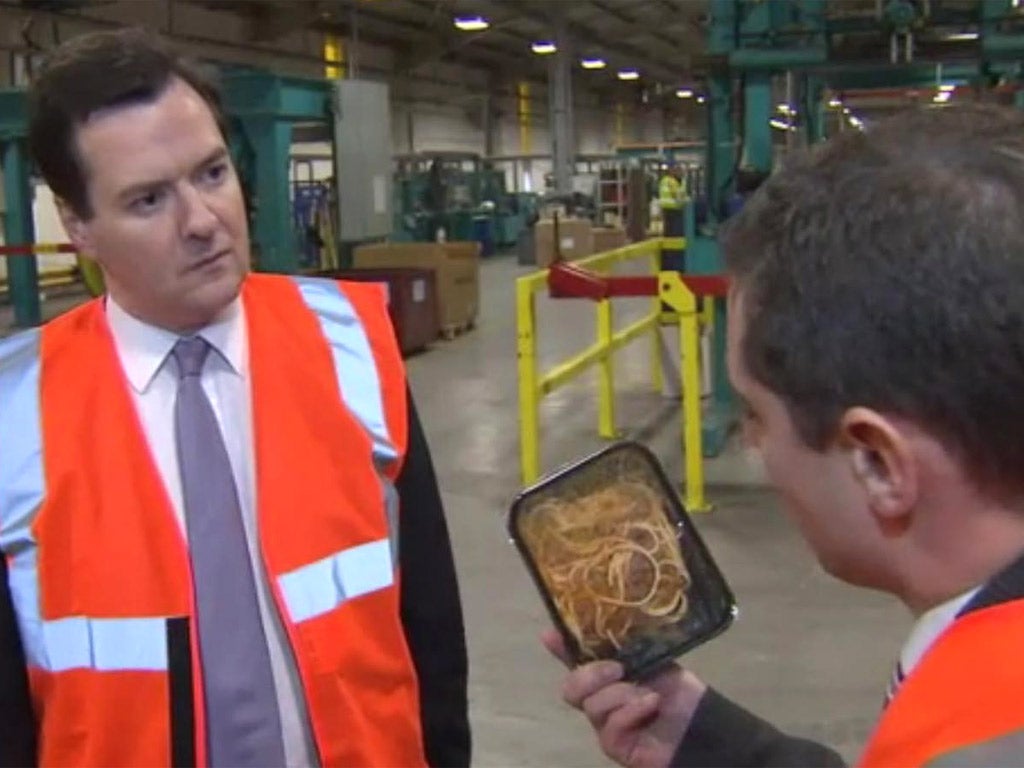MPs push for new powers for FSA as officials seize yet more suspect meat

Your support helps us to tell the story
From reproductive rights to climate change to Big Tech, The Independent is on the ground when the story is developing. Whether it's investigating the financials of Elon Musk's pro-Trump PAC or producing our latest documentary, 'The A Word', which shines a light on the American women fighting for reproductive rights, we know how important it is to parse out the facts from the messaging.
At such a critical moment in US history, we need reporters on the ground. Your donation allows us to keep sending journalists to speak to both sides of the story.
The Independent is trusted by Americans across the entire political spectrum. And unlike many other quality news outlets, we choose not to lock Americans out of our reporting and analysis with paywalls. We believe quality journalism should be available to everyone, paid for by those who can afford it.
Your support makes all the difference.Food Standards Agency officials investigating the adulteration of beef with horse meat seized more supplies, as MPs demanded the watchdog be handed greater powers to check for fraud in the meat trade.
FSA inspectors struck at Farmbox Meats, near Aberystwyth, one of two meat-processing plants that they and the police raided the previous day. Batches of meat stored on pallets at the rear of Farmbox's offices were taken away for analysis.
The fresh action came as European countries stepped up their efforts to trace horse meat illicitly slipped into the food chain in the guise of costlier beef. As he joined EU agriculture ministers meeting in Brussels to discuss how to tackle the crisis, the Environment Secretary, Owen Paterson, admitted that authorities had been ignorant of the scale the scandal, which has so far led to the withdrawal from sale of more than 10 million products following the discovery of horse DNA in Irish-made beef burgers last month.
Mr Paterson – who has been criticised for responding sluggishly – said: "This has come up very rapidly. Nobody had a clue that there was adulteration of beef products. It looked like very small amounts."
In the past month Tesco, Aldi, Lidl, Iceland, and Findus have all withdrawn processed beef products because of the discovery of undeclared horse meat.
The wholesaler Makro became the latest company to be affected, announcing that equine DNA had been found in beef burgers supplied by Ireland's Silvercrest, one of the firms involved in last month's recall. Makro said: "One brand, Unger beef burgers 48/4oz supplied by Silvercrest Foods, did contain a trace of horse."
At the request of the FSA, companies are carrying out tests of a wide range of beef products to establish the extent of the contamination. In a report, a House of Commons committee recommends the Government give the FSA statutory powers to force producers to undertake the testing. Launching the results of its short inquiry into the contamination of beef products, Anne McIntosh, chairwoman of the cross-party Environment, Food and Rural Affairs Committee, said: "The scale of contamination in the meat supply chain is breathtaking.
"Elements within the food industry have duped consumers in the UK and across Europe in pursuit of profit. The Government must ensure effective traceability requirements in respect of the sale and marketing of processed foods originating from EU member states, including the UK."
She pointed out that retailer had "responsibilities" to ensure UK food was labelled accurately and gave shoppers sufficient information to make informed decisions about their purchases. The FSA made no comment in response to the report.
The Department for the Environment, Food and Rural Affairs (Defra) indicated that it would be tightening up the rules, saying: "Once we have established the full facts we will take whatever action is necessary so that this unacceptable situation cannot happen again."
A leading academic, Professor Chris Elliott, argued that rather than concentrating on changing the nature of the testing regime for horse meat, ministers and the FSA should be trying to restore the integrity of the whole food system. Professor Elliott, director of the Institute for Global Food Security at Queen's University Belfast, said: "They can't just point their radar system at horse; there are many other things that could be going on."
In the House of Commons, David Cameron reiterated that retailers were responsible for the contents of their products. He warned the state would be taking a tough line on anyone found adulterating meat, saying: "If there has been criminal activity there should be the full intervention of the law."
The comments came after Farmbox Meats and the Peter Boddy slaughterhouse in Todmorden, West Yorkshire, were temporarily shut down by the FSA amid claims they supplied and used horse carcasses in burgers and kebabs.
After the FSA visited Farmbox again, its owner, Dafydd Raw-Rees, insisted the company had done nothing wrong. He added that it would continue to "bone" meat despite being told to cease operations.
In a statement Aled Owen, a solicitor who is representing Farmbox, said: "The company would wish to express its dissatisfaction with the comments made by the FSA, which are untrue."
Would Osborne eat this?
Confronted with a £1.50 spaghetti bolognese, it was hard to tell if the Chancellor looked queasy at questions over the safety of meat products or the thought of digging in to the ready-meal. Asked if he would be prepared to eat the dish, George Osborne said: "What I want is good information on our food."
Findus Beef Lasagne contaminated with up to 100 per cent horse meat was meanwhile being sold for £70 on eBay. The online auction site later said the offending sale had been removed.
Join our commenting forum
Join thought-provoking conversations, follow other Independent readers and see their replies
Comments